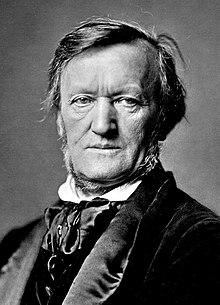Our website is made possible by displaying online advertisements to our visitors.
Please consider supporting us by disabling your ad blocker.
Richard Wagner
Richard Wagner | |
|---|---|
 Wagner in 1871 | |
| Born | 22 May 1813 |
| Baptised | Leipzig |
| Died | 13 February 1883 (aged 69) |
| Occupation | Composer of operas |
| Signature | |
 | |
Richard Wagner (22 May 1813 in Leipzig – 13 February 1883 in Venice) was a German opera composer. He was one of the most important opera composers in Germany during the Romantic period. Apart from some music that he wrote as a student he wrote ten operas which are all performed regularly in opera houses today. Most of his operas are about stories from German mythology. He always wrote the words himself.
Wagner changed people's ideas of what operas should be. He thought that the drama (the story that is being told with all its tensions) was very important, and he chose the singers for his operas himself, so that he could train them into his way of thinking. The music in his operas did not give the audience a chance to applaud after big solos as it had done in the 18th century: it continues throughout the whole act. He made his music tell the story by using what he called “leitmotifs”. These were melodies or short musical phrases which belonged to particular characters in the opera, or to particular ideas. He had more influence on other composers than anybody else in his time, largely because of his harmonies which became more and more chromatic (using lots of sharps and flats), with many changes of key. He built an opera house to his own design in the German town of Bayreuth. Nearly all musicians in Europe tried to make a journey to Bayreuth to hear Wagner's music. The Wagner festival still takes place every year there.
Previous Page Next Page


